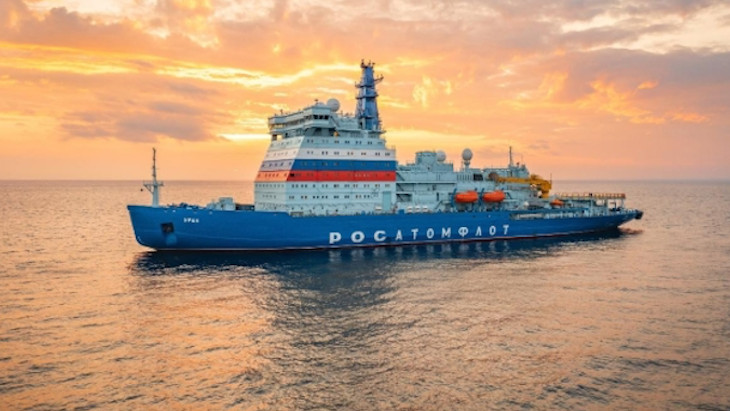Nuclear icebreaker Ural completes sea trials
A new nuclear powered icebreaker, the Ural, has completed factory sea trials lasting more than two weeks. Ural is the third of Russia's Project 22220 vessels built at the Baltic Shipyard.

The Ural (Image: Baltic Shipyard)
After construction of a ship, sea trials check the vessel's general performance, as well as its electrical and power systems, its communication and navigation systems, and physical systems like cranes and its helipad. The Ural was built at the Baltic Shipyard in Saint Petersburg and undertook these tests in the Gulf of Finland.
The success of sea trials indicates that the Ural is broadly on course to be delivered to its owner, Atomflot, by the end of this year, as the Baltic Shipyard has previously said was the plan.
The Ural is the third of the Project 22220 icebreakers, which are known both for their twin RITM-200 reactors and their mission to maintain the passability of the Northern Sea Route, which represents a shorter route for freight to travel between northern Europe and east Asia. They are 173 metres long and designed to break through 2.8 metre thick ice at up to 2 knots. The wide 33 metre beam at the waterline is designed to match the 70,000 tonne ships they are designed to clear a path for.
Arktika was the first Project 22220 ship, with those following known as series vessels. The Sibir entered service in January. Two more of the ships are under construction: the Yakutia and the Chukotka, which are slated for service in 2024 and 2026 respectively.
A variation of the RITM-200 reactor design used on Project 22220 icebreakers is planned for deployment on floating power plants at Cape Nagloynyn. Another variation of the RITM-200 for use on land is planned for Ust-Kuyga.
Researched and written by World Nuclear News
- China Institute of Atomic Energy
- Nuclear Power Institute of China
- Southwestern Institute of Physics
- China Nuclear Power Operation Technology Corporation, Ltd.
- China Nuclear Power Engineering Co., Ltd.
- China Institute for Radiation Protection
- Beijing Research Institute of Uranium Geology (BRIUG)
- China Institute of Nuclear Industry Strategy (CINIS)
- China Nuclear Mining Science and Technology Corporation


